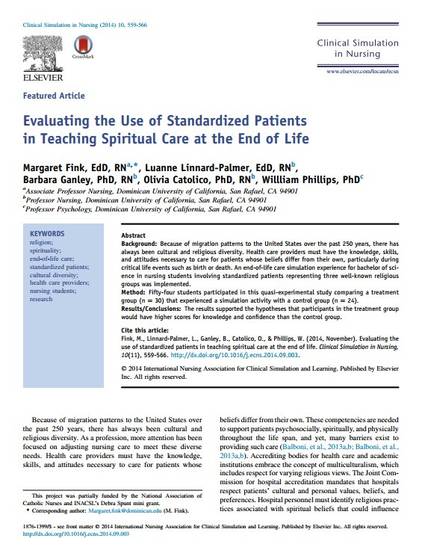
Article
Evaluating the Use of Standardized Patients in Teaching Spiritual Care at the End of Life
Clinical Simulation in Nursing
(2014)
Abstract
Background Because of migration patterns to the United States over the past 250 years, there has always been cultural and religious diversity. Healthcare providers must have the knowledge, skills, and attitudes necessary to care for patients whose beliefs differ from their own, particularly during critical life events such as birth or death. An end of life care simulation experience for BSN students involving standardized patients (SPs) representing 3 well known religious groups was implemented. Method Fifty-four students participated in this quasi-experimental study comparing a treatment group (n=30) that experienced a simulation activity with a control group (n=24). Results/Conclusions The results supported the hypotheses that participants in the treatment group would have higher scores for knowledge and confidence compared to the control group.
Keywords
- Religion,
- Spirituality,
- End of life care,
- Standardized patients,
- Cultural diversity
Publication Date
November, 2014
Citation Information
Margaret Fink, Luanne Linnard-Palmer, Barbara Ganley, Olivia Catolico, et al.. "Evaluating the Use of Standardized Patients in Teaching Spiritual Care at the End of Life" Clinical Simulation in Nursing Vol. 10 Iss. 11 (2014) p. 559 - 566 ISSN: 1876-1399 Available at: http://works.bepress.com/margaret_fink/3/
